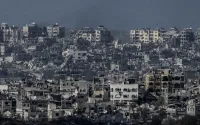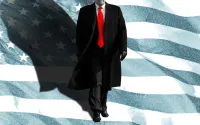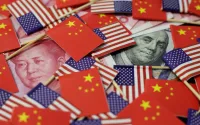2 August 2004Philip Thornton, Economics Correspondent
Ministers from the world's richest and poorest countries struck an 11th-hour deal yesterday to boost trade by cutting farm subsidies and import tariffs worldwide.
After five days of intense negotiation, the World Trade Organisation agreed to an interim text and set a deadline of December 2005 to hammer out a new global deal.
The deal was hailed as "historic" by the WTO and the main wealthy nations but fiercely attacked by activist groups who condemned it as a "catastrophe for the poor."
Ministers worked late into the night for the second day in a row after an initial deadline on midnight on Friday lapsed without a deal.
Failure to reach an agreement would have consigned hopes of a new deal to the dustbin, leading to a fresh round of trade wars and bilateral agreements that would have hurt poor countries and hit economic growth, experts had warned.
The deal strikes a compromise between cuts in subsidies for farmers in rich nations and an agreement by poorer countries to open up their markets by cutting tariffs.
"This is a historic moment for this organisation," said Supachai Panitchpakdi, the WTO's director general. "We have proof again that when our members set their heads and minds together we can overcome all kinds of obstacles."
Under the agreement, key WTO members, including the United States, the EU, Brazil and Japan, have agreed to the eventual elimination of export subsidies.
Wealthy nations currently spend about $370bn (£203bn) a year on all forms of farm support. African and Latin American countries say this enables wealthy farmers to "dump" cheap produce on their markets, annihilating their domestic farming industries.
The deal includes a "down payment" that would see an immediate 20 per cent cut in the maximum permitted payments by rich nations.
West African nations dropped a demand - seen a potential deal-breaker - that the US's $3bn (£1.65m) a year subsidies to its cotton farmers be treated as a separate issue.
Rich countries also agreed to cut tariffs on farm imports that make it tough for poorer countries to compete. The highest agricultural import tariffs will face the biggest cuts, although no figures have yet been agreed.
Nations will have the right to keep higher tariffs on some of the products they consider most important.
The deal on farming cleared the way for accords on access to markets for industrial goods and services, such as banking, water and telecommunications.
The hard-won deal puts back on track the negotiations that were launched at Doha, Qatar, in November 2001, but collapsed at a summit in Cancun, Mexico, last autumn.
Negotiators will return to the table in September to bash out a deal ahead of the WTO's next summit in Hong Kong in December 2005, the final deadline for a deal.
Patricia Hewitt, Britain's trade and industry secretary, who was a leading advocate for the end to farm subsidies, said: "This is a crucial step on the road to delivering a trade round that will benefit all of us, especially developing countries.
"An ambitious round is an important prize for the global economy and we must continue to make progress before next year's ministerial meeting in Hong Kong."
Crucially, France dropped its opposition to the farm cuts which president Jacques Chirac last week described as "unacceptable". Yesterday, French agriculture minister Herve Gaymard said it was a good and balanced accord.
Robert Zoellick, US Trade Representative, said the accord was a "milestone" while his Brussels counterpart Pascal Lamy said the results are good for both the EU and developing countries.
Heavyweight developing countries, such as India and Brazil, that demanded farm reform also welcomed the deal.
"Developed countries have recognised that agricultural trade with a heavy subsidy component is not free trade," said Kamal Nath, India's trade minister.
But pressure groups said yesterday's deal did not guarantee reforms to help the poorest countries. "There are no cast-iron commitments here and no clear timeline for reform," said Celine Charveriat, head of Oxfam's Geneva office.
"The lives and jobs of millions of people depend on these talks but rich countries are still failing to show leadership, pandering instead to vested interests and forcing developing countries to adopt a strategy of damage limitation."
Aileen Kwa, a senior analyst at the Asian trade policy group Focus on the Global South, said the deal was a "betrayal of the world's poor".
THE MAIN POINTS
All 147 members of the World Trade Organisation have agreed on the basis for talks on a trade deal, but still have months of hard negotiations ahead Rich countries have agreed to eliminate all forms of export farm subsidies but can keep some of their domestic support The deal includes a "down payment" that would see an immediate 20 per cent cut in the maximum permitted payments by rich nations Europe's multibillion-pound sugar industry is still outside the negotiations West African states failed in their attempt to open separate negotiations over the US's $3bn (£1.65m) of subsidies for its cotton-growers Poorer countries will have to cut import barriers under which the highest get cut the most Developing countries have to negotiate on rules to make customs procedures easier and less expensive for businesshttp://news.independent.co.uk/low_res/story.jsp?story=546955&host=3&dir=508






